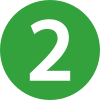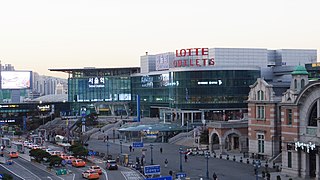
Seoul Station (Korean: 서울역) is a major railway station in Seoul, the capital of South Korea. The station is served by the Korail Intercity Lines and the commuter trains of the Seoul Metropolitan Subway.

Seoul Subway Line 2, also known as the Circle Line, is a circular line of the Seoul Metropolitan Subway. The line running clockwise is called the "inner circle line" and the counter-clockwise line is called the "outer circle line". This is Seoul's most heavily used line, and consists of the main loop, the Seongsu Branch and the Sinjeong Branch for a total line length of 60.2 km (37.4 mi). The Line 2 loop is the third longest subway loop in the world after Moscow Metro Bolshaya Koltsevaya line and Beijing Subway Line 10. In 2019, Line 2 had an annual ridership of 812 million passengers or 2.2 million passengers per day.

Seoul Subway Line 7 of the Seoul Metropolitan Subway was built from 1990 to 1996 and was completed on August 1, 2000 ; the western section between Sinpung and Onsu was put into service on February 29, 2000. This north-south line does not run through the city centre but links Gangnam directly to the northeastern districts of Seoul. In 2019, Line 7 had an annual ridership of 380 million or 1.04 million passengers per day. Although most trains run between Jangam and Seongnam, some trains short turn at Onsu station and some trains start at Dobongsan station.
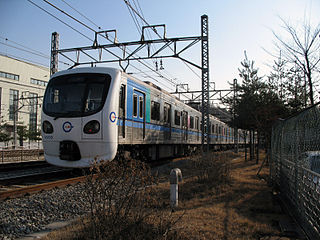
The Incheon Subway is a subway system serving the South Korean city of Incheon. The system is operated by Incheon Transit Corporation, and is part of the greater Seoul Metropolitan Subway.

Seoul Metropolitan Rapid Transit Corporation (SMRT) was established in 1994 to operate the Seoul Subway lines 5, 6, 7, 8 in Seoul, South Korea.

Seoul Subway Line 9, operated by Seoul Line9 Operation, is a subway line in Seoul, part of the Seoul Metropolitan Subway. The line runs east from Gaehwa station or Gimpo International Airport station along the south bank of the Han River towards VHS Medical Center in Gangdong. In 2019, Line 9 had an annual ridership of 225 million or about 616,000 people per day.
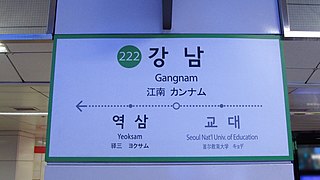
Gangnam is a station on Line 2 of the Seoul Metropolitan Subway. The station is located within the Greater Gangnam Area between the Gangnam and Seocho Districts of Seoul, South Korea. The station is the busiest station on the Seoul Metropolitan Subway, serving over 70,000 daily passengers on average.

Dangsan Station (Korean: 당산역) is an elevated station on the Seoul Subway Line 2 and is an underground station on the Seoul Subway Line 9. The station is located on the south bank of the Han River in Yeongdeungpo-gu. Because the station is elevated, trains exiting to or entering from the north make use of the Dangsan Railway Bridge. As of April 2009, the platform has been outfitted with platform screen doors. Dangsan station is currently a transfer point between Line 2 and Seoul Subway Line 9. Several Korean TV series were shot in nearby locations, like Boys Over Flowers, Iris or My Girlfriend is a Gumiho.

Seoul National University Station is a station on Seoul Subway Line 2, located in Bongcheon-dong, Gwanak-gu of southern Seoul. This station is also known as Gwanak-gu Office Station. There are eight exits, two at each corner of the crossroads – of Nambu Beltway (Nambusunhwan-ro) and Gwanak-ro – where the station lies beneath.

Dongdaemun History & Culture Park station (Korean: 동대문역사문화공원) is a station on Line 2, Line 4 and Line 5 of the Seoul Metropolitan Subway. It is named for the nearby Dongdaemun History & Culture Park. The huge Dongdaemun Market district is centered on this station and Dongdaemun Station, located to the north across Cheonggyecheon.

Cheongnyangni Station (Korean: 청량리역) is a major railway station located at Dongdaemun-gu, Seoul, South Korea. It serves as a terminus for passenger trains serving the eastern part of South Korea. KTX, ITX-Cheongchun, and Mugunghwa-ho trains terminates or stops at this station. Several Seoul Metropolitan Subway lines serve the station. These are: Seoul Subway Line 1, the Gyeongchun Line, the Suin–Bundang Line and the Gyeongui–Jungang Line.

Geumjeong Station is a ground-level metro station on lines 1 and 4 of the Seoul Subway network in South Korea. The station is in Gunpo, a city approximately 15 km (9.3 mi) south of Seoul in Gyeonggi Province, between the cities of Anyang and Suwon. The name means that the land is covered with waves everywhere and that the water wets women's clothes.
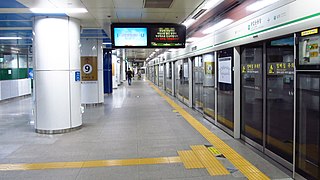
Sports Complex station is a station on Seoul Subway Line 2 and Seoul Subway Line 9. As its name indicates, it serves the nearby Seoul Sports Complex including Seoul Olympic Stadium. Asia Park is also accessible by foot from the station. In early 2015 this station become a transfer station between Line 2 and Line 9 of the Seoul Subway.

Express Bus Terminal Station is a station on Seoul Subway Line 3, Line 7, and Line 9. The stations are located in the Greater Gangnam Area, Banpo-dong, Seocho District, Seoul, Korea.
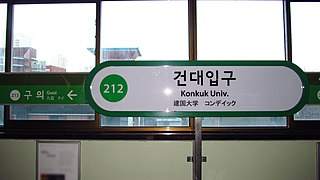
Konkuk University Station is a rapid transit station on Seoul Subway Line 2 and Seoul Subway Line 7. It is located in Hwayang-dong in the Gwangjin-gu administrative district of Seoul. It is adjacent to Konkuk University from which it takes its name. Line 2 is serviced by an elevated platform while Line 7 is serviced by an underground platform. The station has connections to ten bus lines through its six exits as well as a connection to the airport shuttle bus. The station services Hwayang-dong as well as Jayang-dong and Noyu-dong. The area around the station is mixed residential and small commercial businesses. Exits from the underground Line 7 platform open into Konkuk University and the adjacent Star City shopping and high-rise residential tower complex.

Seongsu Station is a rapid transit station on Seoul Subway Line 2. It is located in Seongsu-dong in the Seongdong-gu administrative district of Seoul. It is also the southeastern terminus of Line 2's Seongsu Branch to Sinseol-dong. Trains needing to be serviced take the Seongsu Branch from this station and go to the Gunja Train Depot behind Yongdap Station.
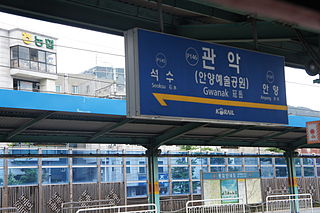
Gwanak Station is a station on the Seoul Subway Line 1 and the Gyeongbu Line. It takes its name from a famous mountain to the northeast.

Jihaeng Station is a ground-level metro station on Line 1 of the Seoul Subway in Jihaeng-dong, Dongducheon, South Korea. It opened on January 30, 2005, to services on the Gyeongwon Line and services on the Seoul Metropolitan Subway began calling here on December 15, 2006. The station offers access to Dongducheon Foreign Language High School, Central Middle and High School, Jihaeng Elementary School, Science Tower and Songnae-dong Office, among other places.

Oido station is a subway station on Seoul Subway Line 4 and the Suin–Bundang Line in Siheung, South Korea. It is the current southwestern terminus of Seoul Subway Line 4 located almost 30 kilometers southwest of Seoul, connecting Oido to other parts of Korea. A commuter rail trip between this station and Seoul Station takes over an hour, and a train servicing depot is located nearby. The name of the station was decided by the surrounding area Oido island.

Anyang Station is a ground-level subway station on Line 1 of the Seoul Metropolitan Subway. The station is located in the Anyang One neighborhood, in Manan District, Seoul. The station's sole exit offers access to Enter-6 Mall, which occupies the same building. Travel time from Anyang Station to Seoul Station on Line 1 is approximately 40 minutes. Anyang Station is the main station in Anyang, but there are another six stations in Anyang, namely Beomgye, Pyeongchon and Indeogwon on Line 4, and Myeonghak, Gwanak and Seoksu on Line 1, though the latter's platforms lie within Seoul. It is connected with Lotte Dapartment Store.
























